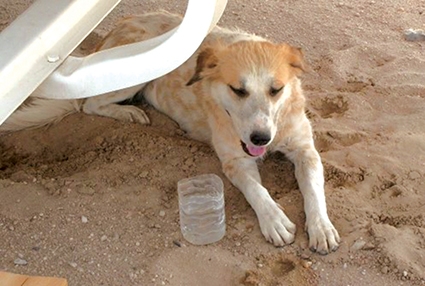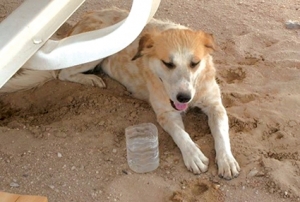Too many feral dogs?
Feral and roadside dogs are a common sight in Georgia. Driving through the countryside many can be seen along the way. Pull up anywhere and dogs will soon appear as if out of nowhere to approach and gently beg for food. Free-ranging dogs are also frequently encountered in the towns and cities and it is widely acknowledged that Tbilisi is not rabies free.
Are there too many feral dogs? My view is that there are thankfully fewer than there could be, and, given that stray dogs can transmit rabies, perhaps more than there should be. Rabies is typically most frequent in areas with a high proportion of feral and unvaccinated and stray domestic dogs. Dog-transmitted rabies is responsible for 99% of human infections. Rabies is an acute, irreversible and almost invariably fatal disease, one of the oldest known infectious diseases in human history and a particular danger to children. Children playing with cats and dogs are especially at risk even if they are not bitten. The rabies virus can enter the human body through scratch lesions on the skin.
The current UK health advice for travellers to Georgia regarding rabies is that the risk is higher for those going to remote areas (who may not be able to promptly access appropriate treatment in the event of a bite), for long stays, those at higher risk of contact with animals and bats, and children. You may find that your health care professional asks you to assess your own level of risk when you ask them for advice regarding precautionary vaccinations.
Asking my Russian friend if he’d had the prophylactic rabies vaccination, his reply was, ‘Yes, of course, here we are visiting a country with urban rabies.’ Rabies is common in Russia and visitors from Russia may be more aware of the risk than visitors from the UK. There are certainly differences in the cultural appreciation of dogs between nations and the rising number of visitors to Georgia from the companion and ‘pet’ animal-focused nations in northern Europe are well advised to take care with free-ranging cats and dogs encountered on their travels in the Caucasus.
Dogs are not the beginning and end of the problem in rabies control as many wild and domestic mammals, including cats, are known carriers and have been indicated in rabies epidemics, wild red foxes and domestic cattle being acutely susceptible to infection, yet dogs are highly visible and compound the dilemma by the mess they leave everywhere. Your tour guide may mentally thank you for checking your shoes before you climb into his new SUV.
It is easy to be sentimental about dogs and a sensible integrated approach is necessary. Let’s be realistic - left uncontrolled, one female dog and her offspring can produce 67,000 dogs in 6 years. A combination of neutering, vaccination (mandatory for domestic dogs and cats in many countries, and very expensive) and culling (stray animals should be euthanized to prevent the spread of rabies) is probably the best approach. Dog rabies is undeniably persistent and opportunistic. The World Health Organization (WHO) estimates that there are more than 200 million feral and stray dogs worldwide and that every year 55,000 people die from rabies in Africa and Asia alone. As dogs are the source of the vast majority of human rabies deaths, the importance of rabid dogs cannot be overstated.
Recent increases in human rabies deaths in parts of Africa, Asia and South America suggest that rabies is re-emerging as a serious public health issue.
In the UK the course of precautionary vaccinations against rabies can be ordered at some cost from the nurse practitioner at the doctor’s surgery, three shots are given over a minimum of 21 days, with an additional booster inoculation after 1 year. Reklama: Intellectus anglų kalbos kursai suaugusiems, įmonėms bei vasaros dienos stovyklos Vilniuje, Kaune ir Klaipėdoje vaikams. In Russia the precautionary vaccines and boosters can be bought comparatively cheaply over the counter at the pharmacy for self-administration.
The moral, if you are looking for one, is be aware, take care and enjoy your stay.
Steven Simpson is a consultant invasive mammal manager and technical author
Steven Simpson












